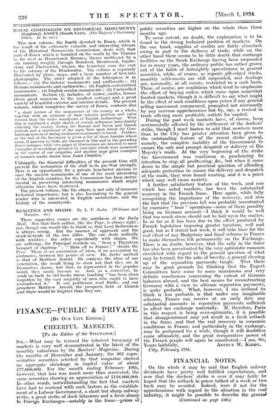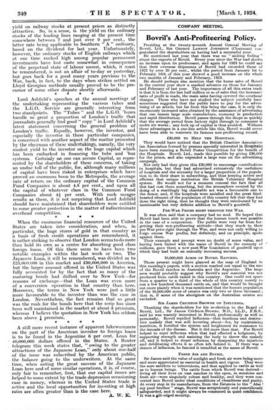FINANCIAL NOTES.
On the whole it may be said that English railway dividends have pretty well fulfilled expectations, and now that the dockers' strike is over it may fairly be hoped that the setback in prices talked of a week or two back may be avoided. Indeed, were it not for the apprehensions with regard to the situation in the coal industry, it might be possible to describe the general (Continued on page 3404 yield on railway stocks at present prices as distinctly attractive. So, in a sense, is the yield on the ordinary stocks of the leading lines ranging at the present time somewhere between 7 and just over 9 per cent., the latter rate being applicable to Southern A " ordinary, based on the dividend for last year. Unfortunately, however, the ordinary stocks of English railways which at one time ranked high among popular permanent , investments have lost caste somewhat- in consequence' of the perpetual state of labour unrest, which, it must be remembered, is not an affair of to-day or yesterday, but goes back for a good many years previous to the War, back, in fact, to the days when strikes settled on Lloyd Georgian methods usually proved to be the pre- cursor of some other dispute shortly afterwards. * * Lord Ashfield's speeches at the annual meetings of the undertaking representing the various tubes and the L.G.O. Service are generally . interesting from two standpoints. The. "Tubes " and the L.G.O. 'buses handle so great a proportion of London's traffic that journalists generally find good " copy " in Lord Ashfield's latest statement concerning the general problem of London's traffic. Equally, however, the investor, and especially the investor in these particular companies, is concerned with another aspect of the matter presented by the chairman of these undertakings, namely, the very modest yield to the investor on the huge capital which has been embarked in financing the tube and 'bus systems. Certainly no one can accuse Capital, as repre- sented by the shareholders of these concerns, of taking an undue toll of the public, for, although many millions of capital have been risked in enterprises which have proved an enormous boon to the Metropolis, the average rate of return on the ordinary capital of the Common Fund Companies is about 4.8 per cent., and upon all the capital of whatever class in the Common Fund . Companies about 4.4 per cent. With such meagre results as these, it is not surprising that Lord Ashfield should have maintained that shareholders were entitled to some greater protection in the matter of indiscriminate overhead competition.
When the enormous financial resources of the United States are taken into consideration, and when, in particular, the huge stores of gold in that country as a basis of fresh credit operations are remembered, it is rather striking to observe that London seems to do mere than hold its own as a centre for absorbing good class foreign loans. Of this there seem to have been two notable examples within the last week or two. The Japanese Loan, it will be remembered, was divided as to £25,000,000 in this market and £30,000,000 in America, but the larger amount offered in the United States was fully accounted for by the fact that so many of the maturing bonds had drifted over to New York—for reasons of exchange—that the Loan was even more of a conversion operation in that country than here. Moreover, the terms in New York were just a little more favourable to the investor than was the case in London. Nevertheless, the fact . remains that so great was the rush for the bonds here that the scrip has since been well maintained in the market at about 3 premium, whereas I believe the quotation in New York has seldom been above i premium. * * * A still more recent instance of apparent lukewarmness on the part of the American investor to foreign loans is to be found in the Argentine 6 per cent. Loan for 40,000,000 dollars offered in the States. A Reuter telegram this week states that, " owing to the greater attractions of the Japanese Loan," only about one-half of the issue was subscribed by the American public, the balance going to .the underwriters, At the same time, when noting the great success of the Japanese Loan here and of some similar operations, it is, of course, only fair to remember, first, that our capital issues are helped to some extent by the trade depression occasioning ease • in money, whereas in the United States trade, is active and the local opportunities for investing at high rates are often greater than is the case here. A. W. •











































 Previous page
Previous page